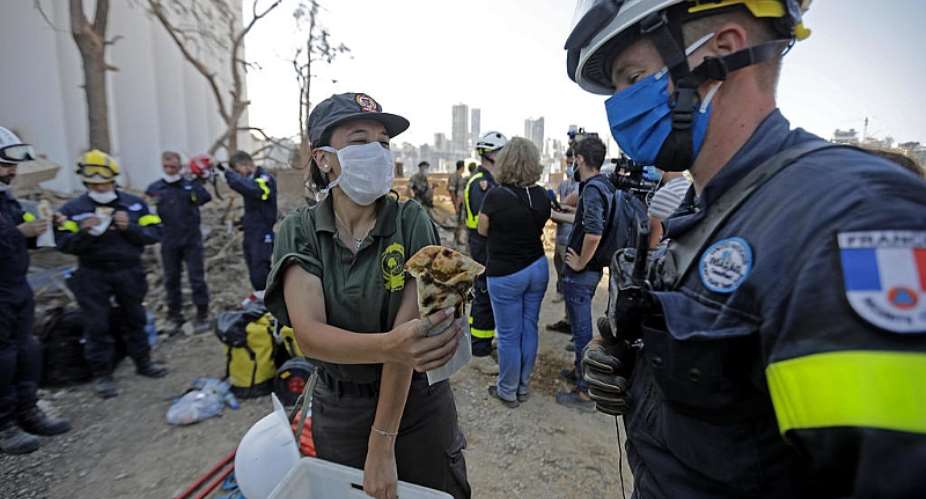Four days after the giant explosion at Beirut's port, a 55-strong French contingent was at the forefront of international rescue operations. Speculation is rife as to the cause of the deadly blast, and Lebanese authorities have detained 21 people.
Speculation continues over what caused the fire that sparked the giant explosion of over 2700 tonnes of ammonium nitrate, stockpiled for years at Beirut's port.
Rhosus, a Moldovan-flagged ship, was supposed to have transported this extremely dangerous cargo from Georgia to Mozambique six years ago.
But the cargo never reached its destination.
On Friday, Lebanese President Michel Aoun suggested that either 'negligence' or 'foreign interference through a missile or a bomb' were responsible for the incident that killed over 150 people and injured thousands more.
He has, however, refused an international inquiry into the blast.
Rescue work centred around port's control room
On Friday, efforts to find survivors were focused around the port's main control room, as a significant number of people were believed to have been working there at the time of the explosion.
A 55-strong French contingent was at the heart of rescue efforts.
The team's leader, Colonel Tissier, compared the site to 'ground zero' after the September 11 attacks in New York, and also to the 2010 Haiti earthquake.
Port officials detained as angry Lebanese protest
In response to the explosion, Lebanese authorities have detained 21 suspects as of Friday, including Beirut port's general manager, as well as customs officials and engineers.
Dozens more were being interrogated by Lebanon's military court, including government authorities who may have ignored warnings about explosive materials at the port.
However, these measures did not quell the anger of dozens of angry anti-government demonstrators who stormed the streets of central Beirut on Thursday.
Some vandalised stores and threw stones at security forces who fired tear gas to disperse the demonstrators.
An impending humanitarian crisis?
The United Nations and The World Health Organisation were quick to raise the alarm about the situation in Lebanon.
Nearly 80,000 children were among the 300,000 people who had been left homeless, UNICEF said on Friday.
Moreover, The UN's World Food Programme (WFP) warned of severe disruption to food provisions, as 85 percent of Lebanon's food was imported.
The World Health Organization (WHO), pointed at a possible shortage of medical provisions. It said it lost several containers of essential medical supplies in the blast, including personal protective equipment (PPE) that was completely burnt.
(With AFP and France 24)





 We’ll no longer tolerate your empty, unwarranted attacks – TUC blasts Prof Adei
We’ll no longer tolerate your empty, unwarranted attacks – TUC blasts Prof Adei
 Bawumia donates GHc200,000 to support Madina fire victims
Bawumia donates GHc200,000 to support Madina fire victims
 IMF to disburse US$360million third tranche to Ghana without creditors MoU
IMF to disburse US$360million third tranche to Ghana without creditors MoU
 Truck owner share insights into train collision incident
Truck owner share insights into train collision incident
 Paramount chief of Bassare Traditional Area passes on
Paramount chief of Bassare Traditional Area passes on
 Two teachers in court over alleged illegal possession of BECE papers
Two teachers in court over alleged illegal possession of BECE papers
 Sunyani: Victim allegedly shot by traditional warriors appeals for justice
Sunyani: Victim allegedly shot by traditional warriors appeals for justice
 Mahama vows to scrap teacher licensure exams, review Free SHS policy
Mahama vows to scrap teacher licensure exams, review Free SHS policy
 Government will replace burnt Madina shops with a new three-story, 120-store fac...
Government will replace burnt Madina shops with a new three-story, 120-store fac...
